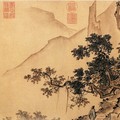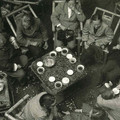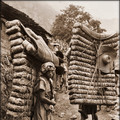Puerh History - Pu-erh.Net
„Yunnan Tea Company standardized the trade number for Pu Erh Tea in 1976 for the purpose of export. Each bingcha has 4 digits: the first 2 digits indicate the manufacturing year, the third digit indicates the leaf grade, the last digit indicates the tea factory (e.g. Kun-Ming 1, Meng-Hai 2, Xia-Guan 3, Pu Erh 4). The loose-leaf tea has 5 digits with the third and fourth indicating the class level of raw materials. Examples of early trade numbers for Puerh Tea are 7452, 7562, 7572, 75671, 76563.“
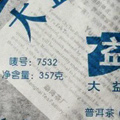
Quotes Tags: Pu-erh, Tea production, Cake, China
„The most classical Puerh Tea is the Bingcha, recorded in Yong-Zheng 13th year in Qing Dynasty (1735). Each tea cake weighs 7 Liang (357 grams). Seven cakes make 1 Tong (wrapped in leaves), weighing 49 Liang. It was sold in nice places and also was exported abroad. It was re-named as "Yunnan Qizi bingcha - Yunnan seven cake tea" during the Cutural revolution.“
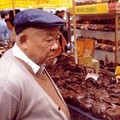
Quotes Tags: Pu-erh, Cake, Tea production, China
„Head Tea (aka Golden Melon) is shaped like a ball, weighing between 2 Liangs and 10 Jins ( 1 Jin = 500 grams). They were mainly for domestic trade or serving as tributes to emperors. Stacks of Golden Melons progressing in size from gigantic to small are considered to be a status symbol.“

Quotes Tags: Pu-erh, Tea production, China
„Mushroom shaped tea appeared in 1912. It was invented at that time in order to prevent the tea from going mouldy during the transportation. It was produced in Xia-Guan and Fo-Hai (two cities in south China) with the trademark "Bao-Yan". The production was then stopped in 1966. In 1986, the production was resumed due to the request of Buddhists in Tibet.“

Quotes Tags: Pu-erh, Mushroom - Jin Cha, Tea production, China
„In 1940, the Chinese State owned company CNNP started to manufacture Pu Erh Tea with a trademark "Zhong-Cha" at the Fo-Hai Tea Factory (now called "Meng-Hai Tea Factory"). Later, Yun-Nan Tea Company and Guang-Dong Tea Company also produced the same brand and started to export abroad. There were varieties such as red-label, green-label, yellow-label, small-letter and big-letter etc.“

Quotes Tags: Pu-erh, Tea production, China
„Brick Tea was mainly produced in the Si-Chuang province prior to 1949. It is now also available in other provinces as well.“

Quotes Tags: Pu-erh, Brick, Tea production, China
„Standard Tuocha tea were defined to weigh 100 gram each. Five make 1 Tong.“

Quotes Tags: Pu-erh, Tuocha, Tea production, China
„Black Puerh Tea was invented by Kunming Tea Factory in 1972/73 and was manufactured in Xia-Guan Tea Factory ever since 1976. It is now manufactured in many different factories and is by far the most popular type of puerh sold.“

Quotes Tags: Pu-erh, Shu - Ripe Puerh, Tea production, China
„Meng-Hai Tea Factory started to use the trademark "Da-Yi" around 1978. Xia-Guan Tea Factory started to register the trademarks "Song-He" and "Nan-Zhao" in 1992.“

Quotes Tags: Pu-erh, Tea production, China
„At the beginning of 1990s, many small tea factories were born. Some of them started to use class level 3 (or even higher) raw tea (which was only available for emperors in the past) instead of level 6 (or even lower) raw tea (which was the traditional material for producing Pu Erh Tea).“

Quotes Tags: Pu-erh, Tea production, China
Theme
Tea by region
We will help you with tea selection.
Do you like quality loose tea?
We will help you to find the right one for you. Be inspired by tea ratings of other tea lovers. Rating stars could help you.


Review your cup of tea.
Review the tea you are drinking and help other tea lovers to find the right cup of tea.



Teas
Sencha Ohira 2012
 1 review
1 reviewTea is an originally packaged in Japan and stored at low temperatures in Slovakia, which guarantees...
2007 Boyou "Man Lu Da Shan" Meng Song
 2 reviews
2 reviewsBoyou tea factory was started by yet another ex-Menghai tea blender. Boyou is well known for showcasing...
2013 Chawangpu Xiao Jin Bing Red Tea 100g
 1 review
1 reviewThis small red tea cake is made from 2012 spring harvest Simao high mountain material. Carefully pressing...
Quotes
„The first flush takes place in late April to early May. The second harvest usually takes place from June through July, and the third picking takes place in late July to early August. Sometimes, there will also be a fourth harvest.“



 Shops
Shops Share on Facebook
Share on Facebook



